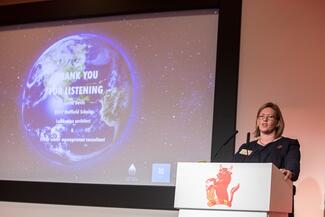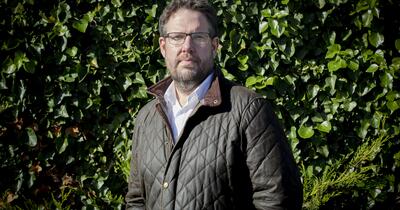
Welsh landscape architect and NFU Cymru Water Quality Project Manager, Lorna Davis NSch 2017, has published her Nuffield Farming report titled “Maximising water’s worth in UK agriculture”. Sponsored by The National Trust, Lorna’s research reviewed the global water context and explored how water is valued publicly, politically and environmentally and found that it was largely undervalued despite being an essential yet limited resource.
“My report aims to illustrate how the value of water needs to be considered on a global scale and discusses methods which enable the agricultural industry to quantify and evidence its environmental impact,” she explains in her Executive Summary. “UK agriculture, by developing and demonstrating real water stewardship, could lead the change for government, retail and consumers to value its contribution and recognize and reward the sector as being an environmental leader of this global resource.”
Lorna also calls for agriculture to begin understanding its ‘water footprint’ through measurement but adds that the issue of water management affects everyone. She concludes that the UK Government has responsibility and is best suited to take the lead in valuing and protecting water.
“At present the UK government documents appear to focus on the provision of water for utility services to meet increasing domestic demands,” she explains. “This could lead to an emphasis only on environmental measures to be taken by the agricultural industry to deal with flood risk and water quality. Recognition of water as a valuable resource to be used effectively in sustainable food production would enable the agricultural industry to develop a resilient approach to the provisioning of food, water, environment and economy, alongside flood resilience to our growing population.”
The report is now available on the Nuffield Farming website at www.nuffieldscholar.org/reports or can be downloaded directly at http://bit.ly/DavisReport.
Lorna presented her findings at the 2018 Nuffield Farming Conference held in Glasgow, Scotland, and can be seen on Nuffield Farming’s YouTube channel at https://youtu.be/kIow-D5ujSs.
Study Objectives
- Review global water context - explore how we value water as a resource publicly, politically and environmentally.
- Illustrate the sustainability potential of agriculture in the UK through its access to soil and water.
- Identify industry toolboxes for resilience.
- Identify opportunities for agriculture and the environment to thrive together by recognising the value of the co-existence of these landscapes.
- Driving forces for change - what methods of regulation, engagement and delivery exist to inform UK policy going forward?
- How can water management which benefits the environment and wider community be valued and rewarded?
Countries Visited
Brazil, USA, Australia, New Zealand, Singapore, Sweden, UK
Messages
- Water is a finite resource: quality affects the availability of quantity. To value both will drive change across society.
- Global trade of water resources needs to understand consumer impacts on availability elsewhere to motivate changing behaviours in government, industry and society.
- A fragmented approach to water management limits the multiple benefits delivered. The UK risks undervaluing its share of water as a global resource in agricultural trade terms, as its national water policy focuses on the consumer market for water utilities and ignores the UK’s global export market of food and manufactured goods and services.
- Prioritising agriculture’s role in resilience to support society, environment and economy is required within the top-down approach to governance.
- Enabling and incentivising industry to measure and manage surface and ground water quantity and quality within the UK would enable farmers to benchmark their performance at a global level.



